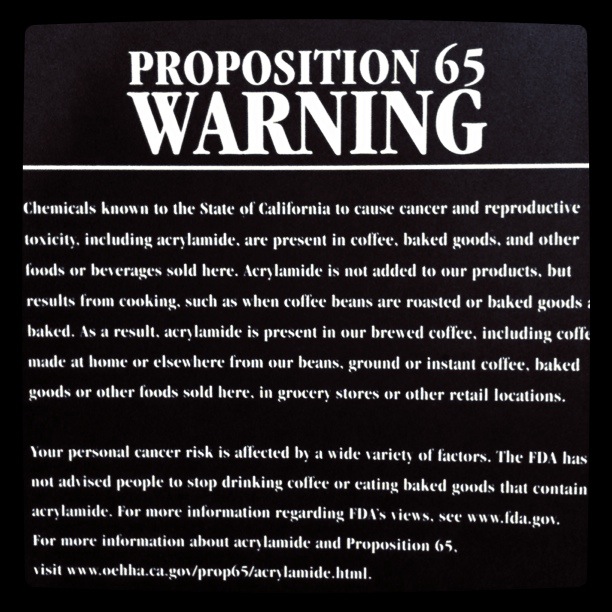California’s Office of Administrative Law officially exempts coffee from list of products that require health warnings following lengthy legal battle over Proposition 65 labelling

A Proposition 65 warning on display inside a Starbucks store in California | Photo: Scott Schiller
California has officially ruled coffee does not pose a 'significant' cancer risk and should not carry a Proposition 65 warning. The exemption will be welcome news for California’s sizable coffee industry, which faced potential fines of up to $2,500 for every person exposed to acrylamide, a known carcinogen produced in small amounts during the roasting process, through drinking coffee in California since 2002.
"This is a great day for science and coffee lovers," said William Murray, president and chief executive of the National Coffee Association (NCA) USA. "With this news, coffee drinkers around the world can wake up and enjoy the smell and taste of their coffee without hesitation."
Introduced following a 1986 public vote, Proposition 65 requires a wide range of consumer products to warn the public on potential contact with chemicals known to cause cancer, reproductive problems and birth defects.
The legislation has become a target for litigious law firms seeking to extract damages from retailers that fail to appropriately label products. A lawsuit first filed in 2010 hinges on the presence of acrylamide in coffee. The Council for Education and Research on Toxics (CERT) argued coffee companies were in breach of the state’s Safe Drinking Water and Toxic Enforcement Act for not warning consumers about the carcinogen.
In April 2018 a judge ruled that a group of more than 90 coffee companies, including Starbucks, Dunkin’ Donuts and McCafé and represented by the (NCA) had failed to offer sufficient evidence that small amounts of acrylamide posed a nominal risk to consumers.
However, In June 2018, the state agency responsible for implementing Safe Drinking Water and Toxic Enforcement Act, or Proposition 65, the Office of Environmental Health Hazard Assessment (OEHHA),
rejected the court ruling that coffee needed to carry a warning. The unprecedented action came as the World Health Organization (WHO) published of a review of more than 1,000 health studies concluding there was insufficient evidence that coffee causes cancer.
The litigation is, however, still pending after being put on hold while the state decided whether to adopt or reject the requirement. The lawyer representing CERT, Raphael Metzger, asserts the exemption violates state law and has vowed to challenge the decision.